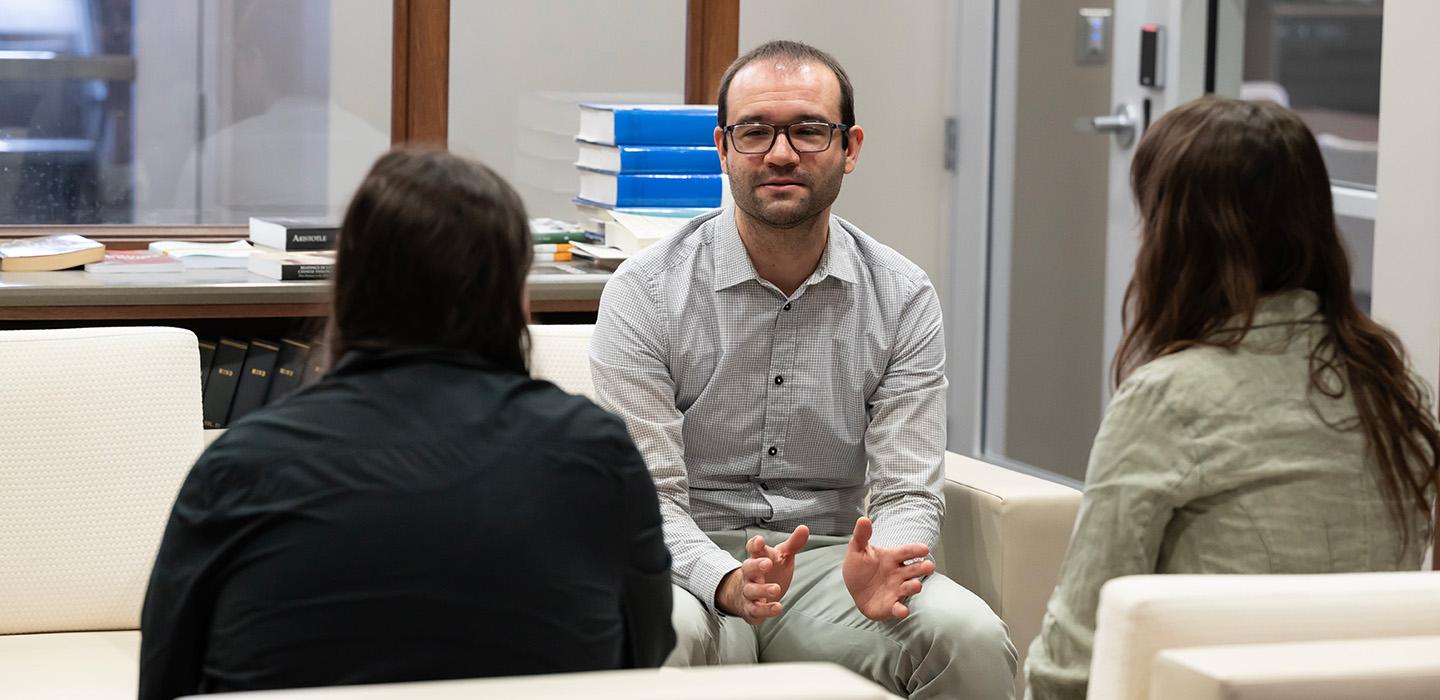
Subscribe to Pittwire Today
Get the most interesting and important stories from the University of Pittsburgh.When Avniel Ghuman got the chance to do some unique studies with people who had electrodes implanted as preparation for surgery to address severe epilepsy, he found himself facing a set of ethical questions he had never encountered before.
He knew just who to talk with to disentangle them. He reached out to Lisa Parker, a philosopher and ethicist who, among her many titles, is the Dickie, McCamey & Chilcote Professor of Bioethics and director of the Center for Bioethics and Health Law. Their work together led to a set of guidelines for Ghuman’s study and further academic collaborations. It also presaged a future project of Parker’s: the Research Ethics Consultation Service (RECS), where researchers connect across disciplines to ensure their research is held to the highest standard of both ethics and science.
And now, researchers, scholars and oversight committee members from any discipline can RECS [at] pitt.edu (request a consultation) by emailing RECS [at] pitt.edu.
“Deciding on the design of a study, what participants to enroll and what questions to ask — those decisions are all going to have scientific aspects. You want your design to be scientifically valid and to deliver the most reliable results at the same time as you want it to be ethical,” said Jonathan Fuller, an assistant professor of history and philosophy of science in the Kenneth P. Dietrich School of Arts and Sciences who now directs RECS. “And occasionally, these things can seem to pull — or actually pull — in opposite directions.”
When he reached out to Parker, Ghuman had already worked with patients who had implanted electrodes in his role as an associate professor of neurological surgery and the director of the Cognitive Neurodynamics Lab. It’s too much for researchers to ask that people get elective brain surgery to participate in a study — so neuroscientists work with patients who have electrodes implanted for other reasons in order to test their ideas in humans with precision.
Most research of this kind tests how a person’s brain reacts when they do something artificial in a lab, like look at photographs of family members. Instead, Ghuman wanted to glimpse inside people’s brains when they were reading a book, playing a board game or talking to thier child. “Some people call it ‘natural neuroscience,’ some people use, ‘real-world neuroscience,’” he said.
Participants would have to wear glasses that recorded what they were seeing so researchers could track what they were up to. That included any people who came into their rooms, like friends and family who came to visit.
After talking through different scenarios and concerns with Parker, Ghuman ultimately decided to put a notice on patients’ doors, alerting people that they’d be recorded and giving them the option of a non-recorded visit. Hospital staff could not opt out, but they were told in advance and if they had any concerns, they were handled on a case-by-case basis. They also had the option to have their faces blurred.
Ghuman’s scenario represents the archetypal clinical research ethics question: How do you set up a study that respects those involved and will produce the most accurate results? RECS takes that same question and applies it far beyond labs and hospitals. An author working on a memoir might find out that a relative died from colon cancer and wonder if they’re obligated to inform family who are potentially at risk for carrying this genetic burden. An engineer developing a new technology might worry about the repercussions if the invention falls into the wrong hands.
“These are perhaps not the kind of bread and butter ethical conundrums that are familiar from clinical ethics,” Fuller said.
A new support
Over the last year, RECS, which is housed in the Research, Ethics and Society Initiative (RESI) that Parker directs, began advertising a new opportunity. Researchers and scholars from any discipline could work with a group of their peers from across the University who have been trained to help people think through the ethical and conceptual questions that arise in the conception, design and conduct of their research. The team has begun offering seminars and reaching out proactively to faculty in high-stakes areas like artificial intelligence and Alzheimer’s research as they try to expand awareness and bring more structured ethical guidance to faculty across the University.
“What is distinctive about the RECS is that it didn’t grow out of a clinical or hospital-based consultation service that served patients and health care providers,” said Parker, who also co-directs the Medical Humanities and Ethics Stream in the School of Medicine. The vision she shared with Senior Vice Chancellor of Research Rob Rutenbar was that of a University-wide service. “This is a consultation service that actually serves any researcher or scholar at any level who has a question about the design and conduct of research or scholarship.”
A knock-on effect of that decision is a more connected University.
Someone grappling with applying thick research concepts such as autonomy, benefit, harm, social value, fairness and scientific validity to their research might benefit from a philosophical consult. Meanwhile, someone having difficulty recruiting volunteers for a clinical trial might find value by working with a historian who has an informed perspective about why some people might be hesitant to volunteer.
“Typically a philosopher or a historian might not be very much involved, if at all, in clinical research or natural science research,” Fuller said. “This is one way in which they can contribute to the research enterprise, by helping researchers in those areas think through challenges in which they have some expertise.
“As a service, RECS is a kind of way of breaking down barriers. It provides a way to cooperate and leverage our strengths across the university.”
Photography by Aimee Obidzinski


